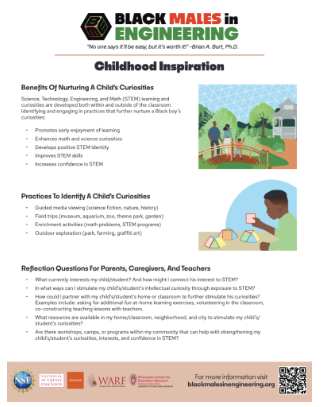UW–Madison’s Burt launches Black Males in Engineering project aimed at combating shortage of Black men in STEM
September 19, 2024 | By Laurel White, School of Education Communications

Brian Burt is an ELPA associate professor and director of the Wei LAB at WCER.
A new multimedia resource aimed at combating the shortage of Black men in science, technology, engineering, and math (STEM) fields launched today at the University of Wisconsin–Madison.
As the shortage of Black men in STEM remains a dire challenge in the United States — according to 2022 statistics from the National Science Foundation, only 2% of STEM-field graduate students were Black men — the new Black Males in Engineering (BME) project aims to offer a pragmatic path forward.
The project, led by School of Education faculty member Brian Burt, provides a robust online resource of research-backed methods for supporting Black boys and men in STEM from primary school through doctoral studies. The resources include a video series and an accompanying set of interactive handouts with guided questions for key audiences, including parents, K-12 teachers, and college advisors.
Burt says the BME project is meant to provide guidance on promising practices at home and in educational settings for all those seeking to help Black students thrive.
“We hope BME will provide support and a path forward for parents and caregivers, as well as teachers, advisors, peers, and students themselves on how to correct inequitable access to careers in science and engineering,” he says.
Some of the guidance outlined in the collection of resources includes:
- For young children, seek to identify a link to STEM in their existing interests.
- For elementary school students, foster growth of learning through play by providing games that are varied in their subjects, aims, and skill requirements.
- For high school students, use culturally relevant lessons and real world applications to engage teen boys.
- For college and advanced degree students, advisors should encourage and facilitate healthy peer-to-peer connections and collaborations to help foster crucial social support systems, as well as connect Black males to community members outside the university.

Five interactive handouts, like this one, offer guidance and concrete steps to key audiences. All handouts are available on the BME website.
Burt also hopes BME social media accounts on Facebook and X will provide a forum for continued discussion and innovation on the subject of Black males pursuing and succeeding in STEM fields.
“Aspiring to a career in engineering can be daunting for Black males and a less traveled road they are expected to pave themselves,” Burt says. “We aim to provide a growing and well-informed community of support for these hardworking students.”
The project was spurred by Burt’s decade of research on the experiences of underrepresented graduate students of color in engineering. He says the project has roots in his own experiences as an undergraduate student exposed to research for the first time, as well as a graduate student who witnessed the supportive community and struggles of his Black peers pursuing advanced degrees in STEM.
“This project has profound personal meaning for me, and represents a decade of work dedicated to providing evidence-based ways to support and nurture future Black scholars and professionals,” he says. “The work ahead to support this group of emergent scholars and STEM professionals will not be easy, but it will be worth it!”
Burt is a professor in the UW–Madison School of Education’s Department of Educational Leadership and Policy Analysis, director of the Wisconsin’s Equity and Inclusion Laboratory (Wei LAB) in the Wisconsin Center for Education Research, and co-project director and co-principal investigator at the new Wisconsin Sloan Center for Systemic Change, or WiSC², an initiative aimed at removing barriers and improving equity in STEM doctoral programs across the country.

Mark Moralez
This fall, Burt will present the BME project at the annual UW–Madison College of Engineering’s Inclusive Excellence Distinguished Lectures Series, along with one of his doctoral advisees vital to the project’s success, Mark Moralez. That event will be held at noon on Oct. 10 in the Marquee Theatre at Union South and will also be presented on Zoom. Additional BME events on campus are forthcoming this spring. Details will be available on BME social media accounts.
The Black Males in Engineering (BME) project is supported and funded by the National Science Foundation, National Academy of Education, Spencer Foundation, Wisconsin Alumni Research Foundation, and Wisconsin Center for Education Research.
Note for media: Burt is available for interviews on the BME project and related subjects. Please reach out to Laurel White at laurel.white@wisc.edu for more information.


